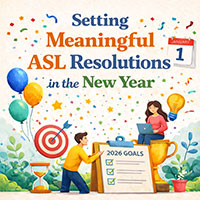
Interpreter Q & A: Are Piercings Ok for Interpreters?
This article is part of our "Dear BC, Interpreter Q & A” series, which answers questions on interpreting and Deaf culture from multiple perspectives. There isn’t always one “right” answer to every question, and different people have different opinions on how to handle different scenarios. That is why more than one perspective is provided in this series, however, more opinions always exist. These perspectives are gathered from talking with experienced interpreters and deaf consumers from across the United States and Canada and do not solely come from the author.
Last week, while team interpreting in a post-secondary setting, I couldn’t believe my eyes when I noticed a shiny metal ball bouncing around on my partner’s tongue. I found it very distracting and fascinating at the same time. Every time she opened her mouth it was all I could see. I know our Deaf client noticed it too, because when she was called on in class she admitted she was not concentrating, and asked if the professor could please repeat the question. My question is – do I say something to my partner or wait for the Deaf client to say something to her?
Sincerely,
Unsure Partner
An Experienced Interpreter's Perspective:
Experienced interpreter teams often have pre- and post- feedback sessions, not only with each other, but often include their consumers. If the Deaf consumer does not address the issue, you should tell your partner that "you" found it distracting and minimally suggest she consider using a clear ball instead of a metal one.
Experienced Deaf Consumer's Perspective:
As Deaf consumers have become more experienced and more empowered to speak up for ourselves in interpreting situations, we feel more comfortable addressing our needs directly with the interpreter. However, if for whatever reason the Deaf student does not address this "visual noise" issue with your partner, you should.
ADVERTISEMENTS
 Brenda Cartwright is a Coda, seasoned interpreter, a master teacher, well known presenter, and author of several best selling sign language and interpreting textbooks from the RID Press. For 35 years Brenda was the Chair of the Sign Language Interpreter Program at Lansing Community College in Lansing, Michigan.
Brenda Cartwright is a Coda, seasoned interpreter, a master teacher, well known presenter, and author of several best selling sign language and interpreting textbooks from the RID Press. For 35 years Brenda was the Chair of the Sign Language Interpreter Program at Lansing Community College in Lansing, Michigan. Interpreter 4-1-1: Top 10 Pearls of Wisdom for Interpreters
Interpreter 4-1-1: Top 10 Pearls of Wisdom for Interpreters Interpreter Q & A: Interpreter Credentials
Interpreter Q & A: Interpreter Credentials Interpreter Q & A: Is It Better to Be Late or Wet?
Interpreter Q & A: Is It Better to Be Late or Wet? Interpreter Q & A: How to Handle Rude Clients
Interpreter Q & A: How to Handle Rude Clients Interpreter 4-1-1: 5 Tips for Job Hunting as an Interpreter
Interpreter 4-1-1: 5 Tips for Job Hunting as an Interpreter






